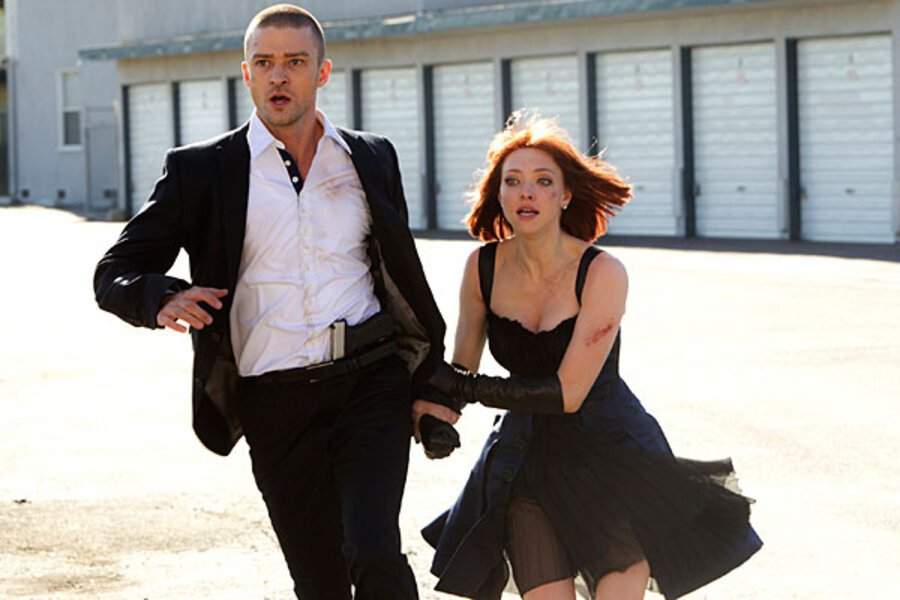In Time is a Bitcoin Movie
In Time, the 2011 dystopic future sci-fi film written and directed by Andrew Niccol and starring Justin Timberlake provides a tangible critique of the world’s financial system. The MacGuffin of the film is quite simple and alarmingly connective: time is money, and when your clock runs out you die. Those that have lots of time can live forever in an elite time zone. Those that don’t have to hustle after they turn 25 to earn more and stay alive in poverty.
The films illustrates how fiat economies and the central banks exacerbate our living conditions by debasing our currencies. It begins with the protagonist Will (Timberlake) and his best friend walking past a dead body on their way into work, to which Will casually comments, “Man another one clocked out.” The nonchalance of death at the onset of the film echos the opening scene in Children of Men, where the hero barely escapes with his life from a coffee shop that explodes simply because he “didn’t take cream or sugar.”
Will and his best friend continue in doors to grab a cup of coffee. The price went up from 4 minutes the day prior to 5 minutes and Will says, “5 minutes for a cup of coffee? Yesterday it was 4.” To which the vendor replies, “Do you want coffee or do you want to reminisce?” This is the stage set for how inflation literally kills the poor, pricing them out of their time minute by minute, day over day. Consider how this frames up against the price of eggs, gas, and a gallon of milk. Shit, frozen pizzas are like $10 now. A currency with no ceiling (hard cap supply) will inflate indefinitely. Conversely, a hard capped sound currency, e.g., bitcoin, is the only known shield from monetary debasement.
As a kind of poetic juxtaposition, Will works as a machinist in a time factory where he churns out small square devices that store time. These objects are kept by banks who hold the majority of time in their vaults. Our protagonist represents a Quixotian figure who struggles to earn enough time to stay alive in the ghetto, but who after helping a beleaguered rich man named Henry Hamilton — that times himself out and gives his watch (reads wealth) to Will — finally has the means to right wrongs, cure injustices, and balance the scales of the economy. Will travels across time zones until he gets to New Greenwich (aptly named as Greenwich, England is where timezones began), where he falls in love with a dashing heroine Sylvia who “comes from time”, and whose father runs the world’s biggest Time Bank (think Federal Reserve).
The other antagonist in this piece is a cop that also once lived in poverty like Will. All cops are called “time keepers”, and their remit is to track stolen and missing time. The keeper knew Will’s father and divulges to Will that he also tried to “give back time”, which “is a very dangerous thing to do”. The time keeper pursues our hero for both the death of Henry Hamilton, and taking the heroine with him as a hostage. A couple plot twists later, Will and Sylvia are down and out with their clocks nearly cleaned. They become romantically entangled and decide to target her father for his greed. The two of them start robbing time banks and giving it back to the poor in a series of Robinhood-type capers.
Countries like Zimbabwe, Venezuela, and Argentina may or may not be where you dear reader live, but they are striking examples of how the general populous is robbed of its time (purchasing power) due to excessive and flippant monetary policy that prints money until it becomes worthless. Worse than your purchasing power losing on average 3-6% year over year, these countries underwent rapid devaluations in their ability to store “time-locked energy”, which is what money really is. Though still quite volatile, the cryptographically secure and un-debase-able digital currency known as bitcoin provides a way out. Those that don’t control the money printer deserve a shield against its wanton usage.
While Rotton Tomatoes thought the concept of In Time was keen but the delivery was a bit heavy handed, I think this film has aged well against our current financial backdrop. If you commit yourself to the reality these characters inhabit, I wouldn’t call it heavy-handed, but rather an invested context driven reality. Sometimes dystopic sci-fi requires time to age well, like a fine wine. This movie was released in 2011, just two years after bitcoin was born. Now, more than a decade later, its lessons and morals pair seamlessly against the backdrop of broken fiat economies, and the overlords that perpetuate them. The film ends with our Don Quixotic hero and dashing heroine stepping out of a car, guns loaded, ready to fight the biggest windmill of all…
Joseph Voelbel is an American born author, comic, and philosopher. His most recent book, PAY ATTENTION TO BITCOIN: The Rise of Digital Gold and its Place in the Evolution of Money (2024) is available on Amazon.





